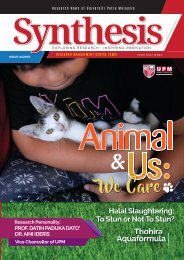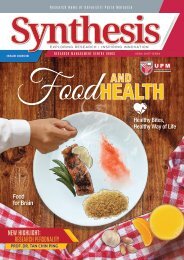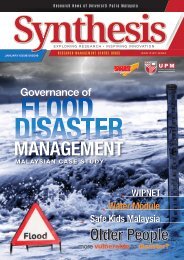SYNTHESIS ISSUE 2 2018: BUILDING OUR HOMES AND COMMUNITIES
The magazine can be download on our department website at https://rmc.upm.edu.my/majalah_synthesis/majalah_synthesis_2018-10215
The magazine can be download on our department website at https://rmc.upm.edu.my/majalah_synthesis/majalah_synthesis_2018-10215
You also want an ePaper? Increase the reach of your titles
YUMPU automatically turns print PDFs into web optimized ePapers that Google loves.
Antartica<br />
Expedition<br />
Special Story<br />
natural and disturbed habitats on Signy<br />
Island to examine the biogeography<br />
and distribution of phenol-degrading<br />
bacteria. Soil samples in this study<br />
have been collected at different sites<br />
around the Signy Research Station and<br />
analysed by examining the salinity, pH,<br />
temperature, inductivity and dissolved<br />
oxygen of the soils. This process only<br />
requires small equipments such as<br />
pH meter, dissolved oxygen meter,<br />
conductivity meter and thermometer.<br />
Then, the soil samples will be<br />
transported to Malaysia for isolating,<br />
screening and characterising phenoldegrading<br />
bacteria.<br />
News<br />
Dr. Siti Aqlima Ahmad is a senior lecturer<br />
from the Biochemistry Department,<br />
Faculty of Biotechnology, Universiti<br />
Putra Malaysia. She is the first female<br />
staff to represent UPM to the Antarctica.<br />
On top of that, Dr. Siti Aqlima gained a<br />
sponsorship from Sultan Mizan Antarctic<br />
Research Foundation (YPASM) through<br />
‘Berth Support’ programme with a fund<br />
of £ 25,000.00, which is equivalent<br />
to RM 150,000.00. Not just that, the<br />
RMC, UPM, has also willing to support<br />
her with RM 38,000.00 through the<br />
‘Putra Maching Grant’.<br />
Before the expedition begins, she<br />
attended the pre-deployment training<br />
consisting of survival first aid, job<br />
specification, survival techniques,<br />
character development and several<br />
other classes for 6 days starting<br />
from 11th -17th September 2016 at<br />
Cambridge University. Her journey to<br />
the Antarctic started by joining the<br />
Antarctic Berth Support together with<br />
British Antarctic Survey (BAS) from<br />
24th Dec 2016- 25th March 2017.<br />
Prior to that, she first flew from KLIA<br />
Sepang, Malaysia on 20th Dec 2016 to<br />
Heathrow, London, to prepare enough<br />
tools and materials for Antarctica. This<br />
preparation took approximately four<br />
days starting from 21st-24th Dec 2016.<br />
After that, she continued her journey to<br />
Punta Arenas, Chile, through Madrid in<br />
Spain, and Santiago in Chile.<br />
station has only seven people working,<br />
two British scientists (Stacey Adlard and<br />
Jesamine Bartlett), one scientist from<br />
Japan (Dr. Megumu Tsujimoto), one<br />
from Malaysia (Dr. Siti Aqlima Ahmad),<br />
along with three BAS staffs that include<br />
one station leather (Matt Jobson), one<br />
filed assistant (Alex Taylor) and one<br />
technician (Iain Gordon).<br />
Suitable with the environment provided,<br />
she has been conducting a study with<br />
the title ‘Diversity and Biogeography<br />
of Soil Bacteria Degrading Phenol’.<br />
This study was conducted in Signy<br />
Research Station, Factory Cove,<br />
Borge Bay located in the Signy Island.<br />
This research station has the latitude<br />
position of 60°43’0”S with a longitude of<br />
45°36’0”W. One of the unique features<br />
in this facility is that this station supports<br />
a variety of projects related to Southern<br />
Ocean ecosystems and climate change.<br />
Furthermore, it is also rare to find any<br />
visitors in the Signy, which therefore<br />
allows the study of microbial diversity<br />
to be conducted using soil samples<br />
at natural (undisturbed) and disturbed<br />
areas at ease.<br />
On top of that, since the collaboration<br />
between Malaysian scientists and BAS<br />
in 1995, Signy Station has been a station<br />
for examining the microbial diversity and<br />
molecular biology in Antarctic. Hence,<br />
soil sampling can be done in a range of<br />
Dr Aqlima completed her research and<br />
lived in the Signy Island, Antarctica, for<br />
a period of 81 days, which is until 22<br />
March 2017. She went out of the Signy<br />
Island via British Antarctic ship known<br />
as the ‘RRS Ernest Shackleton’ to<br />
Falkland Islands. She arrived at Falkland<br />
Islands on 27th March 2017. After that,<br />
on 29th March 2017, she continued<br />
her journey to Cambridge, United<br />
Kingdom, through Ascension Island.<br />
She attended several meetings with<br />
her collaborator Prof. Dr. Peter Convey<br />
at British Antarctic Survey, Cambridge<br />
before she came back to Malaysia on<br />
the 1st April 2017.<br />
She arrived at Punta Arenas on 25th<br />
Dec 2016. As soon as the sun rises on<br />
the 27th Dec 2016, she again continued<br />
her journey to Signy Research Station,<br />
Antarctica, via British Military Ship<br />
known as the ‘HMS Protector’. On 31st<br />
Dec 2016 at 9 p.m, Dr Aqlima finally<br />
arrived at the Signy Research Station,<br />
Antarctica. At present, this research<br />
Dr. Siti Aqlima Ahmad<br />
Department of Biochemistry<br />
Faculty of Biotechnology and Biomolecular Sciences<br />
Tel: 03-8946 8292<br />
E-mail: aqlima@upm.edu.my<br />
<strong>SYNTHESIS</strong> <strong>2018</strong> | 15










